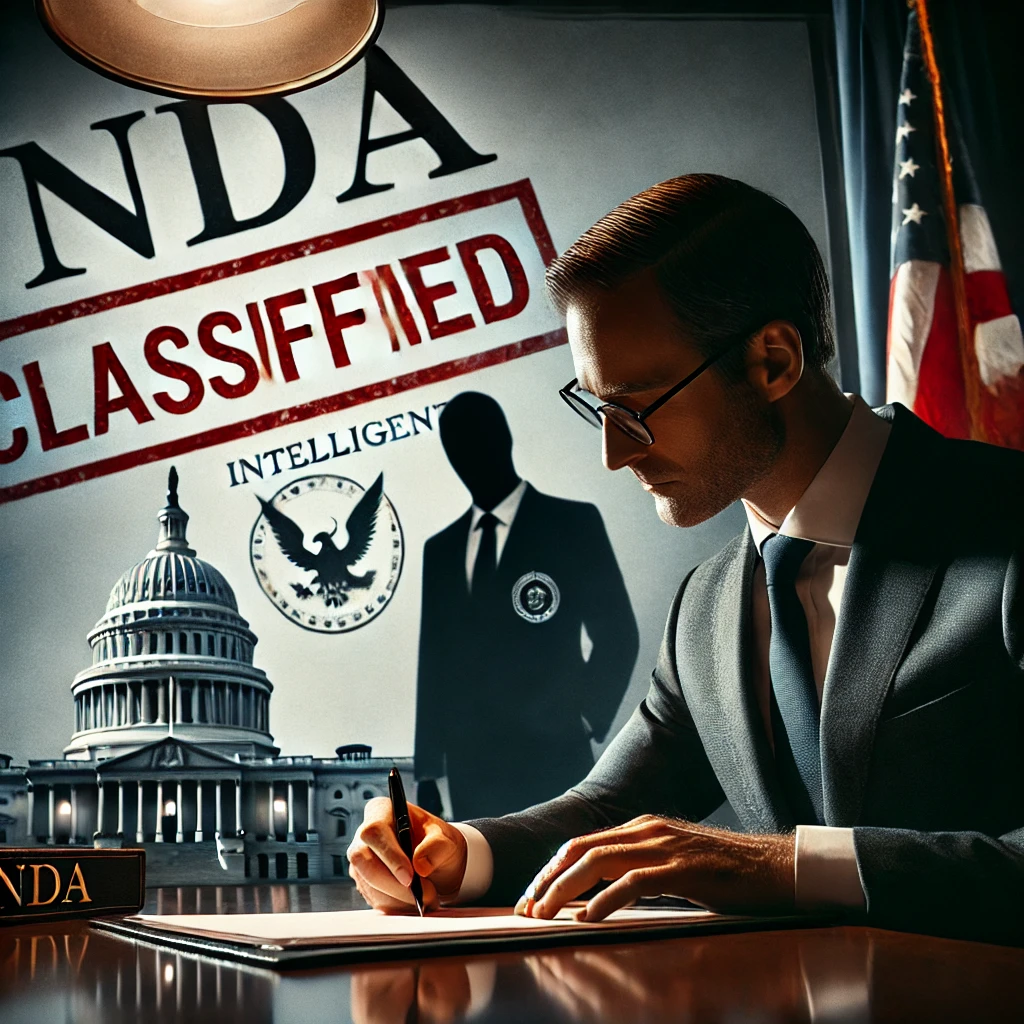For decades, the subject of unidentified aerial phenomena (UAPs) has been a mix of genuine intrigue, disinformation, and bureaucratic secrecy. One recurring theme is the Intelligence Community’s (IC) tight grip on classified information related to UFOs. But how exactly does this control mechanism work? One plausible explanation is the strategic use of Non-Disclosure Agreements (NDAs) to regulate what members of Congress can and cannot say about classified briefings.
The NDA Trap: A Loophole in Congressional Oversight
Members of Congress are constitutionally protected by the Speech and Debate Clause, which grants them immunity from prosecution for things they say in the course of legislative duties. In theory, this should allow them to freely discuss matters of public importance, including UAPs. However, this immunity does not extend to contract law, meaning that an NDA—if signed voluntarily—can still carry legal and civil consequences.
By having members of Congress sign NDAs before classified briefings, the IC creates a scenario where:
- The information they receive is tightly controlled and curated by the IC.
- Even if the information is misleading or incomplete, members cannot publicly challenge it without breaking their agreement.
- The aura of secrecy surrounding UAPs is perpetuated, feeding public speculation while keeping key details under wraps.
Why Would Congress Agree to This?
One might ask: If Congress has oversight over intelligence agencies, why would they agree to these restrictions? The answer lies in the way intelligence operations function. Members of Congress need access to classified information to perform their duties, and refusing to sign an NDA could mean exclusion from important briefings. This puts them in a difficult position: either remain in the dark or sign away their ability to openly discuss what they’ve learned.
Additionally, there is a more personal motivation at play: power. Knowledge is power, and when members of Congress are courted with information—especially knowledge that could change human history—their egos take over. The allure of exclusive access becomes irresistible, and many will sign any NDA they can to gain that knowledge, elevating their own perceived importance and influence. This is human nature at work, reinforcing the cycle of secrecy.
The Public’s Right to Know
We elect representatives to act as our liaisons to government and classified information that should, at some level, be available to the public. When members of Congress sign NDAs, they are effectively blocking the public’s access to that information. While national security concerns may justify some secrecy, the act of signing an NDA itself should not be a secret.
Currently, there is no legal requirement for members of Congress to disclose whether they have signed an NDA. This lack of transparency raises critical questions about the integrity of democratic oversight. If members of Congress are bound by agreements that prevent them from speaking openly, the public deserves to at least know that such agreements exist.
The Implications of Controlled Disclosure
If this postulate is correct, the use of NDAs serves multiple purposes:
- Narrative Control – The IC can selectively disseminate information while preventing Congress from countering or clarifying misleading claims.
- Maintaining Secrecy – Even if a briefing contains nothing groundbreaking, the NDA itself creates an illusion of highly sensitive material, sustaining the mystique around UAPs.
- Suppressing Whistleblowers – By binding elected officials to secrecy, the government ensures that potentially disruptive disclosures remain classified, limiting independent oversight.
A Call for Transparency
It is imperative that lawmakers be required to disclose the existence of any NDAs they have signed, even if the content remains classified. This simple measure would:
- Ensure Public Accountability – The public has a right to know when their representatives are restricted from discussing critical issues.
- Deter Manipulation – Requiring disclosure of NDAs would prevent intelligence agencies from secretly controlling congressional discourse.
- Strengthen Democratic Oversight – Transparency in government strengthens trust and ensures that elected officials remain accountable to their constituents.
Conclusion: A Self-Sustaining Myth?
While this theory cannot be definitively proven without access to classified documents, the logic behind it is sound. The IC, by leveraging NDAs, may be artificially maintaining an air of secrecy around UAPs and other sensitive topics, allowing them to manipulate public perception while keeping Congress in check. Whether this is done to protect legitimate national security interests or to obscure inconvenient truths remains an open question. What is clear, however, is that the use of NDAs creates a structured silence—one that may serve the interests of intelligence agencies far more than those of the American people. So, the next time a congressman hints at knowing more than they can say, ask yourself: Is it because they don’t know the truth, or because they’re legally bound from telling it?
